Somebody I shared a house with many years ago, used to enjoy sewing and would make her own clothes. I remember that she had a large box in which she kept all sorts of off-cuts of materials that might be useful someday. These offcuts would be used to make running repairs like patches or some embellishment to a new item of clothing. She once made me a t-shirt out of some old curtain material she had in her box of fabrics and I still have it. The t-shirt is made out of some synthetic material and has an orange and black paisley like pattern. I wore it out on New Year’s Eve in 1990 and so, it is now more than thirty years old.
I was thinking about this as I was working on the latest draft of a novel I have been writing for some time. In an earlier version of the novel one of the characters told a story that I quite liked and enjoyed writing but, in the end, the story didn’t make it into the next version of the novel and was discarded. The problem was, that I liked the story and believe it is interesting and has some merit in being told. So, that story has found its way into my ‘sewing box of words.’
The sewing box of words contains a lot of things. In my case, there are a couple of novels that were well advanced before being abandoned. There are ideas for novels that are just some notes or a first couple of pages. There are scraps of poems, a couple of lines or an outline of an idea and there are incomplete short stories and a few plays that were also abandoned. When I look back at these files, I find that there are some pieces that are gems and there are pieces that are absolute rubbish. In the world of computers and digital storage, there is less of an impulse to discard the rubbish.
Managing the Words
I’m not all that good at keeping my work organised and I am, over time, trying to get better. One of my struggles is to keep folders up to date and to know which the latest version of a piece is, particularly if they are older pieces. I mainly work from a folder called ‘Writing – Current’ and this contains, as the title suggests, anything that I am working on, or have been working on over the last year. I have another folder called ‘Writing – Archived’ and this contains all the old stuff that I probably won’t go back to and includes early drafts. A third final is called ‘Writing – Final’ and contains what I consider to be completed drafts or anything that has previously been published. The published items are also duplicated in a folder called ‘Writing – Published’ and then there is another folder called ‘Writing Submissions and Competition Entries’ where I keep track of where I have sent things and so I can double check to make sure, for example, that I am not submitting something for a competition that’s already out there.
Building the Sewing Box
I have decided to set myself a task over the next few weeks (although, in reality, it will probably be months) and that is, within my hierarchy of folders, to build a sewing box of words. I want to go through some of my discarded projects and see if within them they contain a useful passage, perhaps a chapter that could become a short story, a line of prose that could become a poem – who knows.

There is an of quoted phrase that says, ‘bad artists imitate, great artists steal’ and this quote has been attributed to a lot of people, in various versions, including Pablo Picasso and T.S. Eliot. In creating my sewing box of words, I want to facilitate a space where I can steal from myself.The other thing that I find interesting in going over the older discarded work is the level of repetition or themes that begin to emerge, and I suppose that this is common for a lot of writers in a world where there probably aren’t a lot of original stories, but there are untold ways to tell those stories. When I was in high school, I was a great fan of John Irving and The World According to Garp was one of my favourite books. I imagine that in Irving’s sewing box of words there are countless repeated and re-told stories or wrestling, bears, infidelity and Vienna – and anybody who has read much of Irving will know what I mean.
Thinking about Irving has made me think about the writers I most enjoyed in my formative years – some of them I am proud to have read in my teens and some of them I am a bit embarrassed about. Who did you read in your teens? I think this might be the topic for my next blog.
